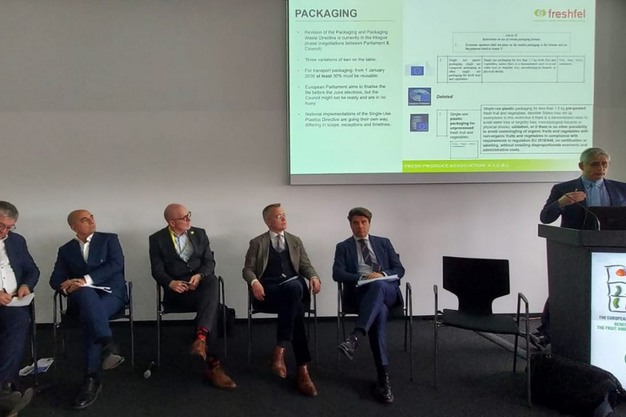The proposed Packaging and Packaging Waste Regulation (PPWR) has reached its final stages with the confrontation between the two positions expressed in late 2023 by the European Parliament and the EU Council.

While discussions are taking place in Brussels to find a compromise between the different proposals, Pro Food, the association representing the main European producers of fresh food packaging, organized at Fruit Logistica, the most important European event in the fruit and vegetable sector, the round table, The European packaging Regulation: benefit or damage for the fruit and vegetable supply chain? during which some of the strategic representatives of the sector brought their experiences and evaluations on PPWR.
Very critical on the proposal of eliminating packaging for fruit and vegetable is Massimiliano del Core, president of Ortofrutta Italia, who stressed the importance of plastic packaging in defending the value of products and prolonging shelf life, a relevant aspect especially for the export of fruit and vegetables.
Luigi Scordamaglia, CEO of Filiera Italia and president of Eat Europe, is also on the same lines, noting how this proposed regulation would lead to the destruction of 32,000 jobs in Italy alone. "On the one hand, the EU invests funds in promoting the consumption of healthy foods of which fruit and vegetables are central, and on the other hand, by eliminating packaging, it prevents the very promotion of these products while also increasing food waste."
Also opposed to the ideological attitude of the European Commission is Luc Vanoirbeek, chairman of the F&V working group of COPA-COGECA, who specifies that laws must be fair, realistic and affordable. PPWR does not meet any of these requirements.
Martin Engelmann, general manager of IK Industrievereinigung Kunststoffverpackungen, which represents the plastics processing industries in Germany, points out that from the point of view of the legal approach, the ban on the use of only plastic packaging probably violates the principle of equal treatment enshrined in EU law, unless there is an objective justification for differential treatment.
Philippe Binard, Freshfel Europe's delegate general, points out that pointing the finger at the fruit and vegetable sector is disproportionate to its impact on the volumes of packaging placed on the market: "In fact, packaging for fresh produce accounts for only 1.5 percent of all food packaging currently used in the EU. Moreover, about 50 percent of fruits and vegetables are already sold in bulk, showing that the market has already optimized as much as it could be."
The risks to the sustainability of the fruit and vegetable supply chain brought about by ill-considered regulatory proposals are not unique to the European Union. Daniel Duguay, sustainability specialist at CPMA (Canadian Produce Marketing Association), brought testimony of this, explaining how in Canada they are experiencing a situation very similar to that in Europe because of the federal Ministry of Environment's proposal.
For more information:
Pro Food
www.profooditalia.it/news
